Richard Henry Pratt writes a letter to inform the Commissioner of Indian Affairs that he underestimated the cost of clothing on the previous Estimate of Funds. He will need to spend $35 to $40 per pupil instead of $17.
1882
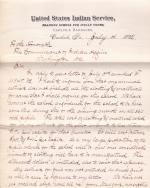
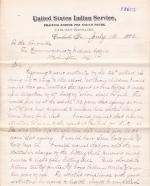
Richard Henry Pratt details the number of students he is able to accept from various Indian Agencies including the Rosebud, Pine Ridge, Kiowa and Comanche, Pawnee and Ponca, and the Cheyenne and Arapaho. Pratt provides instructions as to the preferred age and gender composition of the students and notes that he has already arranged for…
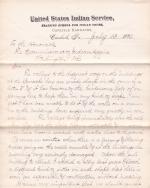
Richard Henry Pratt requests to replace the gutters on older buildings to prevent further damage to the structures. Pratt outlines the cost of the tin to update the gutters as well as hiring an additional mechanic on the irregular rolls.
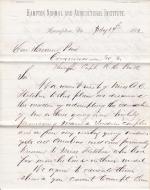
Samuel C. Armstrong writes that the Hampton Normal Institute is willing to educate three married Omaha couples along with three girls and one boy as government students if Alice C. Fletcher is able to bring them with the Sioux delegation going to the Carlisle Indian School. Richard Henry Pratt notes that he would be willing to accept married…
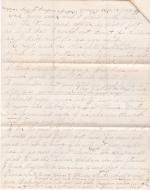
Man on the Cloud writes to Richard Henry Pratt regarding a promise that was made to the Cheyenne delegation about providing a spring wagon to each member. Man on the Cloud also makes reference to the returned Cheyenne students from Carlisle and changes happening locally.
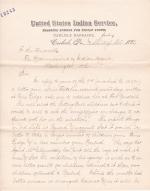
Richard Henry Pratt comments on a letter he has received from Alice C. Fletcher regarding student recruitment in the Rosebud and Pine Ridge Agencies. Fletcher recommends taking more students from Pine Ridge due to the actions of Agent V. T. McGillycuddy which allow returned students to succeed.
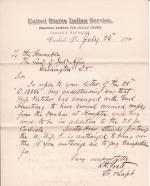
Richard Henry Pratt replies to a letter from the Office of Indian Affairs concerning a delegation of Omaha students being brought east by Alice C. Fletcher.
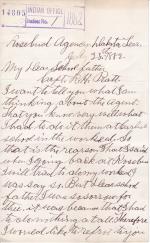
Ralph Iron Eagle Feather writes to Richard Henry Pratt discussing how there is now work for returned students at the Rosebud Agency. In Pratt's comments to the Commissioner of Indian Affairs he notes that the Agent at Pine Ridge has but all of the returned students to work and a similar initiative should be implemented at Rosebud.
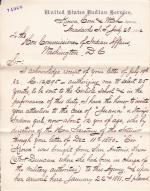
U.S. Indian Agent for the Kiowa Agency, P. B. Hunt, provides the circumstances of Juana, a member of the Navajo Nation, who was brought to the Kiowa Agency a year prior. Hunt recommends sending to her to Carlisle and then possibly placing her in a home in the east.
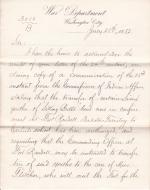
Robert Todd Lincoln, Secretary of War, acknowledges the letter from the Commissioner of Indian Affairs that A. C. Fletcher will select ten students from the Sitting Bull being held at Fort Randall with assistance from the Fort's Commanding Officer.
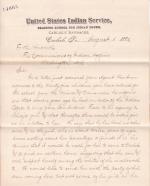
Richard Henry Pratt recommends accepting a proposal of U.S. Indian Agent Hunt for enrolling a Navajo girl now at the Kiowa Agency separate from the agency's allotment of students.
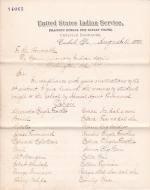
Complying with Indian Office orders, Richard Henry Pratt provides a list of students brought to the Carlisle Indian School by Special Agent E. B. Townsend for the fall of 1882. Students were from the Osage, Kaw, and Nez Perce Nations.
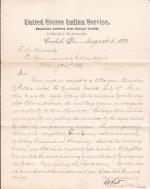
Richard Henry Pratt informs the Commissioner of Indian Affairs that he has received a letter from Alice C. Fletcher that the military officer in charge of the Sitting Bull prisoners at Fort Randell does not have permission to turn children over to her to take to Carlisle. Fletcher also notes that Charlotte Four Horns is anxious to come to…
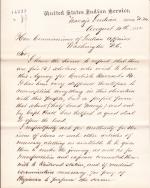
U.S. Indian Agent for the Navajo Indian Agency, Galen Eastman, reports that there are five students from the Agency who wish to attend the Carlisle Indian School due to recruiting from a Carlisle student. As a result Eastman requests authority to pay for various expenses related to having them enroll including transportation to Carlisle.
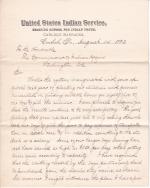
Richard Henry Pratt provides a report on the outing system for the Summer of 1882. Pratt notes that he placed 85 students in homes for the Summer and that he was able to secure transportation costs from patrons as well as a salary for the student. Pratt ends by requesting the ability to visit students who remain on outing over the fall.
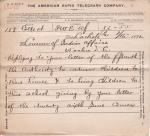
Richard Henry Pratt claims he has the authority to accept and return students from the Secretary of the Interior.
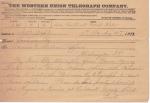
Richard Henry Pratt forwards a request from Anna Ely to the Commissioner of Indian Affairs to instruct the Pawnee Agency to send Pawnee children to Carlisle.
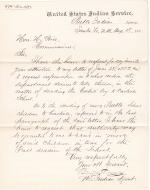
Benjamin M. Thomas, U.S. Indian Agent for the Pueblo Indian Agency, requests information on sending a student from Cochiti to Carlisle in addition to sending more Pueblo students to Carlisle.
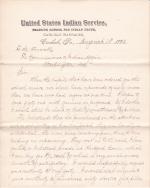
Richard Henry Pratt notes that the school will have additional children than in previous years necessitating additional beds and pillows. In addition the previous bed stands are not as durable as hoped.
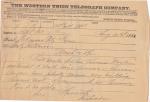
Inspector J. M. Haworth recommends that the Pawnee Agency send ten Pawnee students to Carlisle five of whom were to be girls.
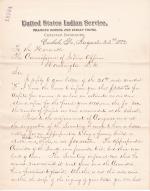
Richard Henry Pratt provides an estimate for the cost of running the Carlisle Indian School including $225 per student per year in additional to $30,000 for various improvements to the School.
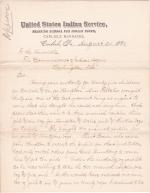
Richard Henry Pratt notifies the Commissioner of Indian Affairs that the delegation brought back by Anna Ely is different then what was approved. Pratt notes that he has sent certain students to the Hampton Institute as previously approved and Ely has agreed to raise charitable funds for the additional students with the help of one of the girls…
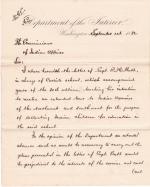
Acting Secretary of the Interior, M. L. Joslyn, instructs the Commissioner of Indian Affairs to stop Richard Henry Pratt from traveling West as had written previously. Pratt had desired to go West in order to bring back Sioux students from various agencies as well as a group of Navajo students.
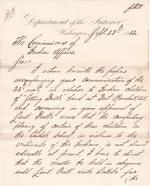
Correspondence regarding the enrollment of children from the Sitting Bull band of Sioux being held as prisoners at Fort Randall. The officer in charge of Fort Randall indicates that the parents of the eligible children do not wish to see their children to be enrolled at Carlisle. Pratt notes that he would prefer to speak to these parents to…
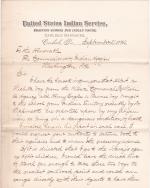
Richard Henry Pratt requests to return Alfred Charko (mistakenly listed as Albert in Pratt's letter, but properly identified at Alfred in the physician's letter) and Henry Eagle Chief to their homes due to their ill health. Pratt notes that he can escort the students back to their homes if he is given permission to visit the Navajo Agency.
